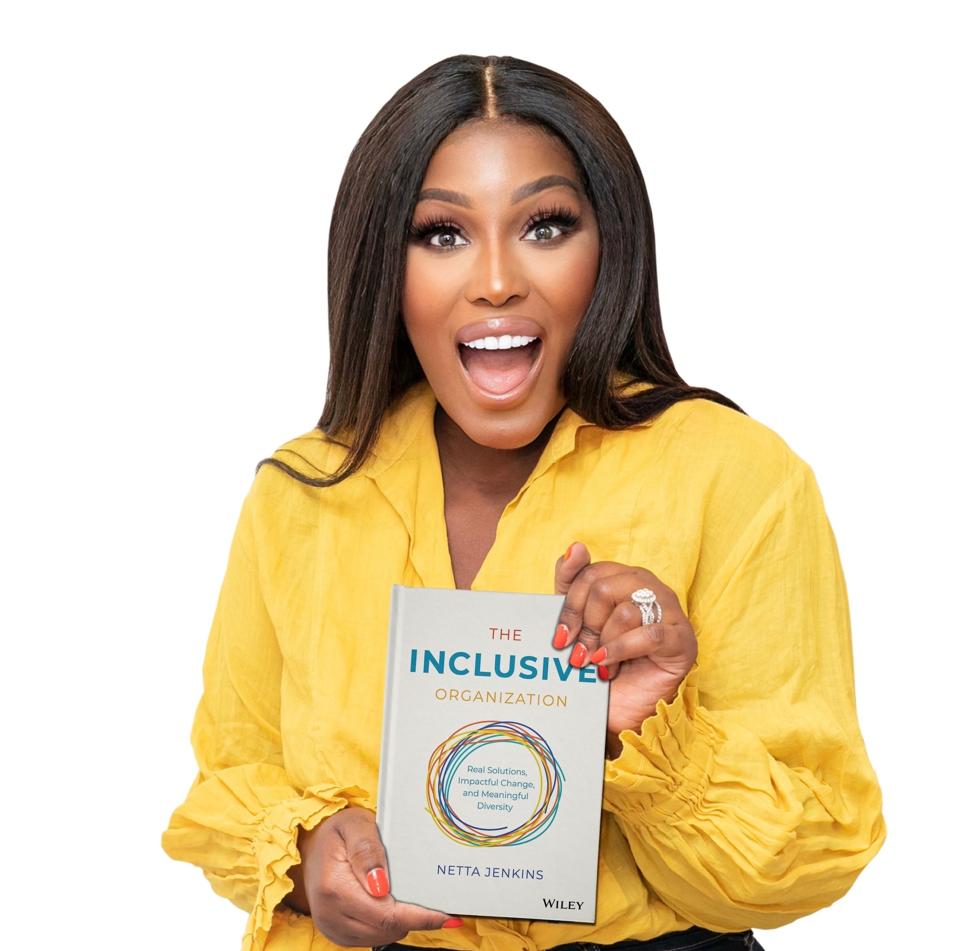Have you ever heard of employee resource groups? Also known as affinity groups, employee resource groups are spaces for underrepresented groups to connect in the workplace. Many teams have employee resource groups which allow colleagues from similar backgrounds to connect through Slack, email, and in-person gatherings. From Bain to Google, leaders at major companies are realizing the acknowledging and pushing for inclusion benefits employees and leadership.
And Aerodei CEO Netta Jenkins is on a mission to make corporate America more inclusive. She started working as a DEI consultant over 15 years ago and has made serious progress since. As the CEO and founder of Aerdei, a performance platform and inclusion performance platform that democratizes and quantifies inclusion efforts in a collaborative way, she has changed the DEI landscape.
With over 200,000 followers on LinkedIn, Jenkins is reaching an international audience. The global inclusion leader has also made an impact by educating corporate leaders through her book The Inclusive Organization: Real Solutions, Impactful Change, and Meaningful Diversity, which was released in June of this year. Although she wrote a DEI focused book, Jenkins isn’t done speaking up for diversity, equity, and inclusion in the corporate sector. “We all know that there’s a narrative that’s being shaped around DEI,” she said. “But it is extremely important for any organization and for the people within the organization for them to thrive.”
I spoke with Netta Jenkins about three reasons why companies should have employee resource groups.
Create A Safe Space
Employee resource groups provide psychological safety for BIPOC, LGBTQIA+, and disabled employees, managers, and executives. After years of facing discrimination, members of underrepresented groups want to know there is a space where they can communicate and collaborate with coworkers who fully understand their identity and experience. “Affinity groups provide a safe space for people from overlooked groups to really speak candidly and freely about their experiences,” Jenkins told me.
Sadly, many people are afraid to be honest about how they feel when it comes to inclusion in the workplace. Some fear backlash for being perceived as too honest or divisive. Others are concerned their employer won’t care about their thoughts on company DEI efforts. Being candid about the need for more inclusion shouldn’t cause people to fear losing their jobs. That’s why it’s important to have a DEI team, not just HR.
“A lot of people are inherently afraid of HR and they feel like HR is just here to protect the organization. Whereas DEI becomes this advocacy department where people feel safe,” said Jenkins.
Encourage Collaboration
According to Jenkins, affinity groups aren’t just a place to relate to people from similar cultures. They also serve as an opportunity to encourage and engage in collaboration. When people from overlooked groups have a space to speak more freely, they may be more open about their ideas for the company’s approach to DEI.
From organizing work functions for specific cultures and holidays to exchanging ideas across different departments, there are so many ways for colleagues to work together in employee resources groups. Jenkins told me that she is a big believer in the power of affinity groups.
“Affinity groups provide a space for folks to share their learnings, share wisdom, discuss how best to navigate career paths. Affinity group members have the ability to collaborate on projects, amplify each other’s voices, to help each other propel,” she said.”
Drive Change
Providing a space for employees from underrepresented groups absolutely drives change. Know that performative DEI is something that has become a problem in the DEI world. Unfortunately some companies will only discuss queer issues during PRIDE Month or ask for feedback from Black employees during Black History Month. Those companies are practicing performative allyship.
So, if you want to have motivated employees it’s important to make sure they believe leadership is following the company’s mission. “Drive change in perspectives, policy and practices. With affinity groups they [employees from underrepresented groups] have the power to engage with leaders. Definitely with the people team with an HR team to understand okay, these are the gaps,” Jenkins told me.
“If you’re hiring employees, you want them to be productive. You want them to get their work done. If people don’t feel safe, if they don’t feel a sense of belonging, if they don’t feel respected in their dynamics, then they’re going to take their time to do other things” she said.” She isn’t wrong. As someone with an intersectional identity myself, including being Black, queer, and neurodivergent, all we want is to be seen, heard, and respected in the workplace and beyond.

